Anxiety and Light Sensitivity
Published: 9 May 2025
Why does your heart race in bright light? Why do you feel panicky walking under harsh ceiling bulbs? If you’ve ever wondered whether your anxiety is somehow linked to the way your eyes react to light, you’re not alone.
This article explores the surprising relationship between anxiety and light sensitivity, a combo that leaves many people confused and overwhelmed.
You’ll see how anxiety can actually make your eyes more sensitive to light, and how that same sensitivity can fuel even more anxiety. Real people share what helped them break the cycle.
1- What is Light Sensitivity (Photophobia) in Simple Words
Think about when your eyes need to adjust. Like when you:
- Open the fridge at night and flinch
- Leave your house on a sunny day without sunglasses
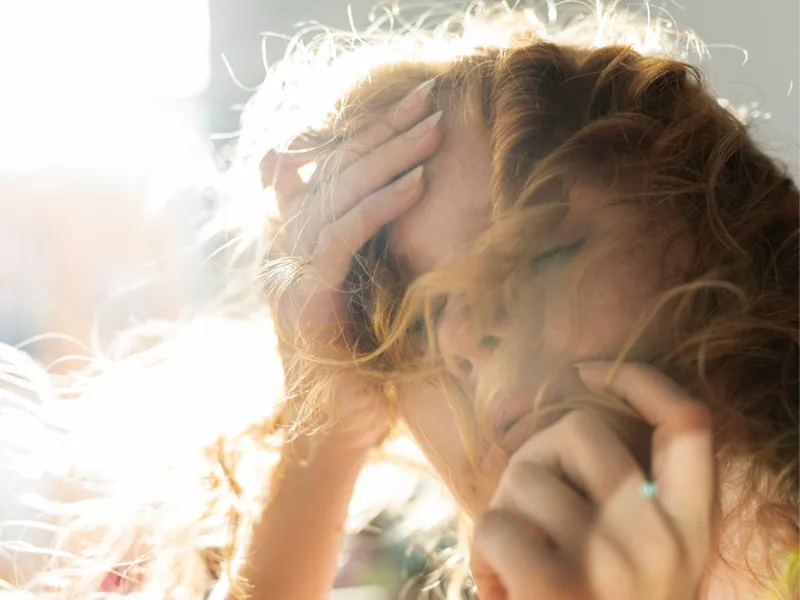
Now imagine feeling like that all the time, even in places that don’t seem that bright. That’s what it’s like for people with chronic light sensitivity.
1.1 Top 6 Anxiety-Driven Light Sensitivity Symptoms You Shouldn’t Ignore
According to the American Academy of Ophthalmology, anxiety messes with your senses. Here are common light sensitivity anxiety symptoms people often report:
- Eyes feel strained or tired, especially after screen time (linked with eye strain anxiety symptoms).
- Bright lights feel “too bright”, even normal ones like indoor bulbs or phone screens.
- Flinching or squinting in everyday lighting, like a cloudy day or car headlights.
- Feeling panicky or overwhelmed in well-lit stores or hospitals.
- Blurry or distorted vision — some even say “my eyes play tricks on me” during anxious episodes.
- Over-focusing on your vision and thinking something’s wrong (common in health anxiety cases).
1.2 What Causes Light Sensitivity?
Light sensitivity can show up in many health conditions, physical, neurological, and even emotional. Common causes include:
- Migraines – Nearly 80% of migraine sufferers report light sensitivity as a symptom.
- Eye strain – From too much screen time or poor lighting.
- Mental health issues – Anxiety, depression, and PTSD can make the brain more reactive to light.
- Medications – Certain drugs (like antidepressants or antibiotics) can make your eyes more sensitive.
2- How to Know If Your Light Sensitivity Is Caused by Anxiety (Not Eyes or Something Else)
Determining whether light sensitivity is linked to anxiety or a physical eye problem can be tricky. After all, both conditions can make the same symptoms feel overwhelming.
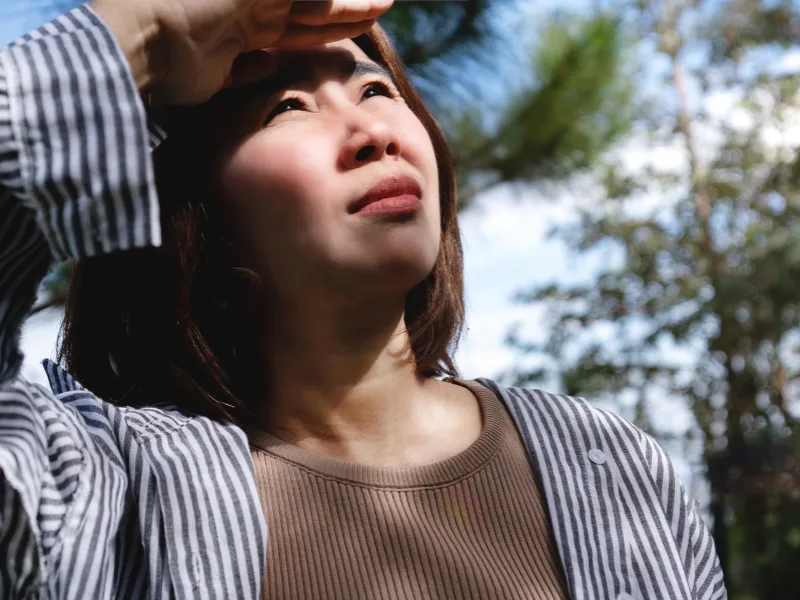
But there are ways to tell the difference and address it accordingly.
| Feature | Anxiety-Related Light Sensitivity | Eye-Related Light Sensitivity |
| Trigger | Emotional state (stress, panic, overwhelm) | Physical eye issues (glaucoma, dry eye, infections) |
| Pattern | Comes and goes with anxiety levels | More constant and persistent |
| Associated Symptoms | Racing heart, dizziness, tension, fear | Eye pain, redness, blurry vision, irritation |
| Mood Connection | Worsens with anxiety or panic | Not linked to mood |
| Response to Calm Environment | Often improves when anxiety eases | Doesn’t improve just by relaxing |
| Need for Medical Check-Up | May benefit from therapy or anxiety treatment | Needs an eye doctor (ophthalmologist) evaluation |
| Example Scenario | The lights feel too bright during a panic attack at work | Light hurts every day, even when relaxed, with blurry vision |
Hang tight—coming up, you’ll see how anxiety tricks your brain into fearing light
3- How Anxiety Can Make You Sensitive to Light
Why does a bright light feel too bright when you’re already stressed or anxious? It’s not your imagination, it’s your nervous system in overdrive.
3.1 Anxiety Switches Your Brain to “High Alert”
When you feel anxious, your brain thinks there’s danger, even if there isn’t. It flips into fight-or-flight mode, releasing stress hormones like cortisol and adrenaline.
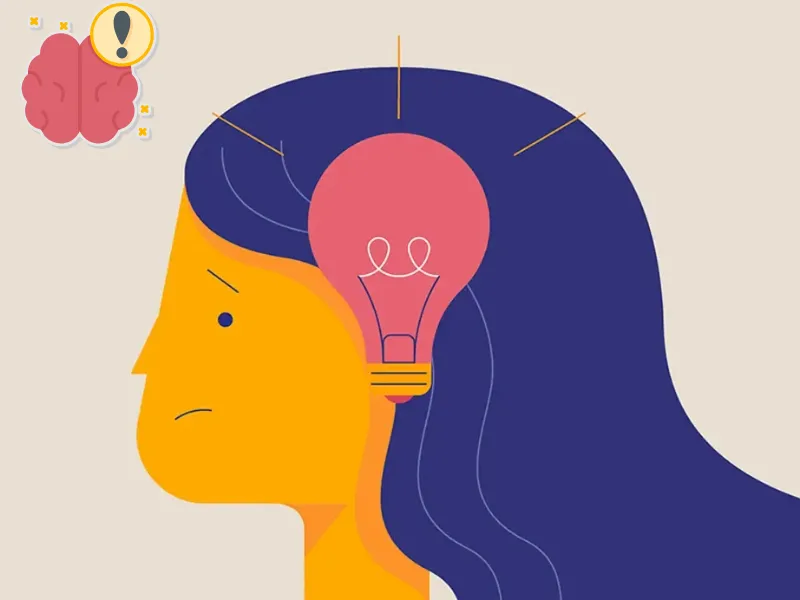
This state makes you hyper-aware of everything: sounds, smells, touch… and light. Even a normal room light might feel intense or “wrong.” Your brain starts to perceive light as a threat, even when it’s completely harmless.
3.2 The Vicious Cycle of Light Sensitivity and Anxiety
Here’s how it turns into a loop:
- Bright light makes you feel uncomfortable
- You get anxious about the discomfort
- That anxiety makes the light feel even worse
- You start avoiding light and worrying more
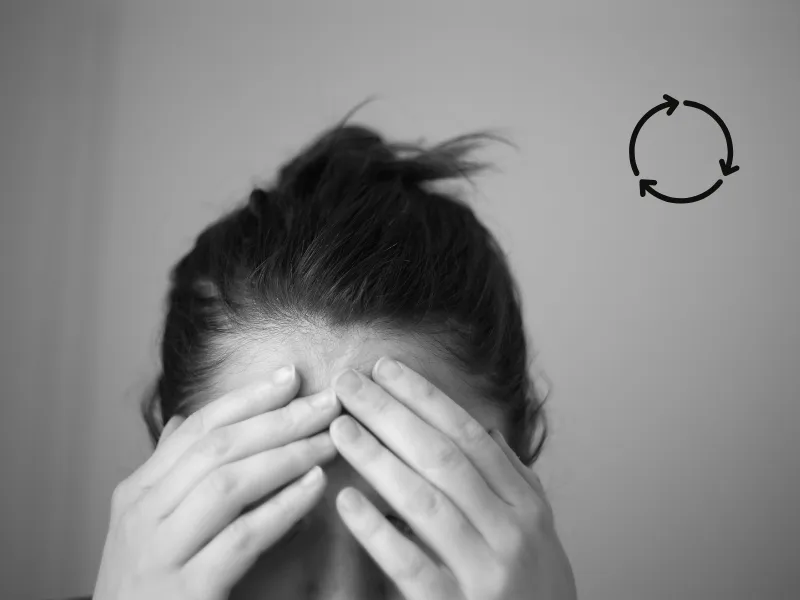
Before you know it, your brain links light with panic. It becomes a vicious cycle.
3.3 The Overlap with Sensory and Neurological Disorders
Some people with anxiety also deal with:
- Sensory Processing Disorder (SPD) – where the brain can’t filter light, sound, or touch properly
- Migraine + Anxiety Combo – where one triggers the other
- PTSD or OCD – where light can become a part of obsessive worry or emotional flashbacks
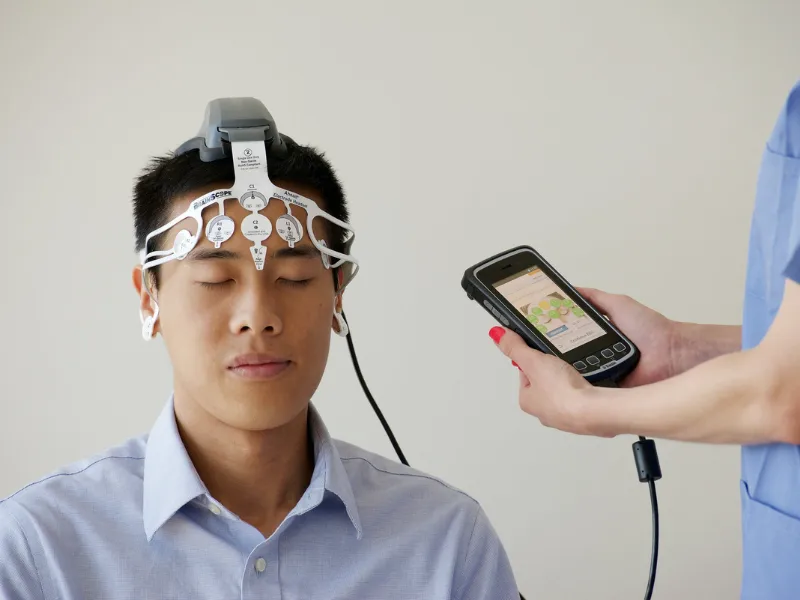
In these cases, anxiety isn’t just linked to light sensitivity. It actually amplifies it.
Absolutely. Anxiety puts your nervous system on edge, making everyday stimuli feel threatening.
Tips coming soon: how to reduce light-triggered anxiety fast (without medication).
“It felt like the lights were drilling into my brain. I’d start sweating, my chest would tighten… I thought I was going crazy.”
After some trial and error, he replaced them with warmer, softer lighting, and the panic stopped.
Wait till you see what researchers found about anxiety and your visual cortex—scroll down!
4- Expert Opinions & Scientific Backing
Let’s dig into what science and specialists say about the connection between anxiety and light sensitivity, and it’s more real than most people think.
4.1 What Experts Say About Anxiety and Light Sensitivity
Dr. Michael Cutrer, a neurologist at the Mayo Clinic, explains that:
People with anxiety often experience a “lower threshold for sensory input,” meaning their brains overreact to normal stimuli, like light or sound, because their nervous system is already in a hyper-alert state.
Your brain is always “on guard,” so even normal light can feel like a threat when you’re anxious.
4.2 What the Research Says
A study in the Journal of Anxiety Disorders found that individuals with generalized anxiety disorder often report increased visual discomfort, including light sensitivity.
5- What You Can Do: Coping Tips and Lifestyle Adjustments
Living with anxiety-related light sensitivity can be challenging, but there are practical steps you can take to make it more manageable.
5.1 Wear Polarized or Blue-Light-Blocking Glasses
If you’re sensitive to bright lights, especially fluorescent or blue light from screens, consider wearing polarized or blue-light-blocking glasses.
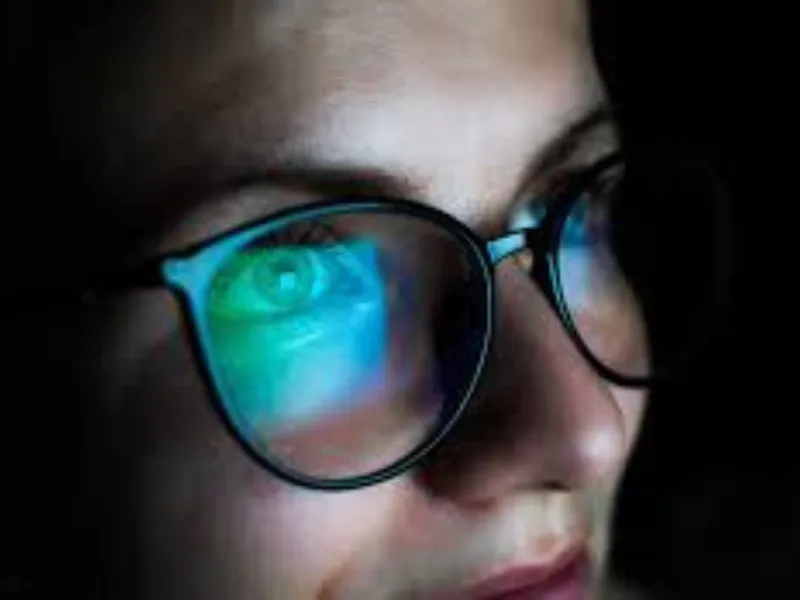
- Why? These types of glasses reduce glare and help soften the intensity of light, which can be especially helpful when you’re outdoors or working under harsh artificial lighting.
Try wearing them when you’re using your phone, working on a computer, or even when stepping outside to help ease discomfort.
5.2 Use Warm Lighting at Home
Harsh LED or fluorescent lighting can aggravate light sensitivity.
- Switch to warm, soft lighting at home.
- Why? Warm lights are less intense and less likely to trigger anxiety.
- Consider dimmer switches or light bulbs with a lower wattage to control the lighting to your comfort level.
Set the lighting to adjust according to the time of day to mimic natural light, which can also help regulate your mood.
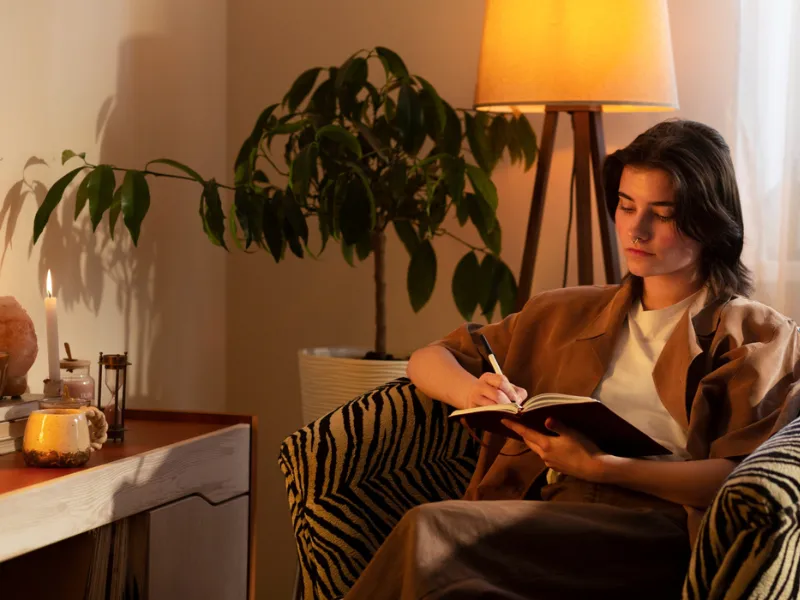
5.3 Practice Grounding Techniques for Anxiety
Light sensitivity often worsens when anxiety spikes. To manage this, grounding techniques can help bring you back to the present moment.
- Use strategies like 5-4-3-2-1 (where you name 5 things you can see, 4 you can touch, and so on) to re-center yourself.
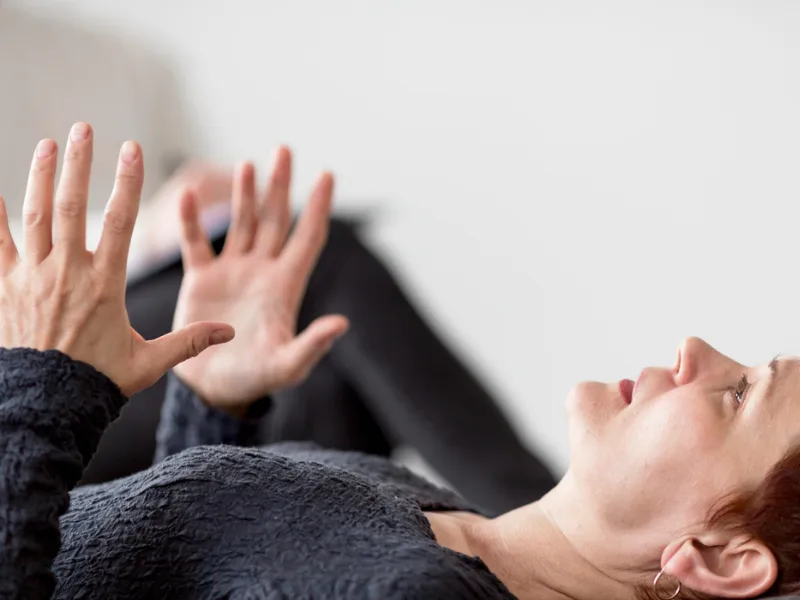
- This simple exercise helps distract from anxiety and light sensitivity by focusing on your surroundings.
5.4 Mindfulness, Deep Breathing, or Short Meditations
Regular practice of mindfulness and relaxation techniques can reduce anxiety levels and, in turn, light sensitivity.
- Spend a few minutes each day practicing deep breathing exercises, progressive muscle relaxation, or meditation.
Apps like Headspace or Calm offer short meditation sessions designed to help reduce anxiety and improve focus.
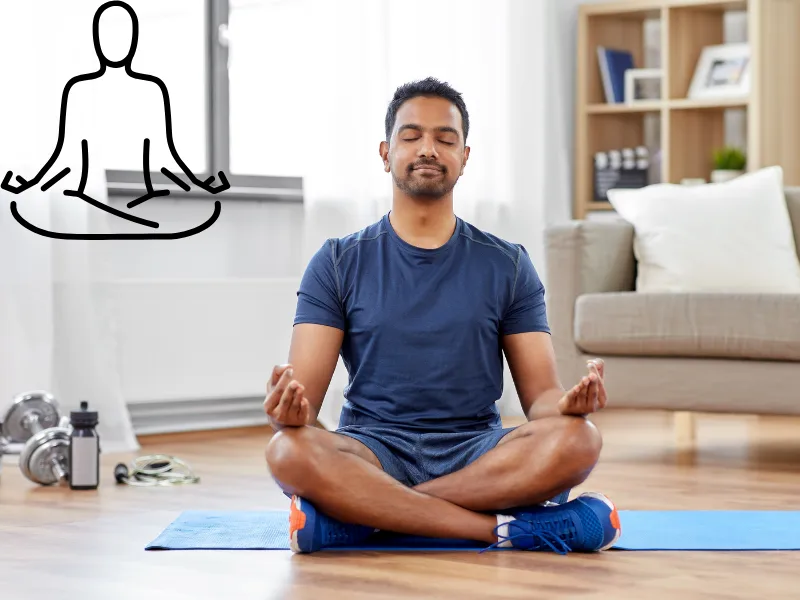
5.5 When to Consider Therapy or Medication (Consult a Doctor)
If anxiety-related light sensitivity is affecting your daily life, it might be time to consult a professional.
- Cognitive Behavioral Therapy (CBT) has been shown to help people with sensory overload and anxiety.

- If necessary, your doctor might recommend medications like SSRIs or benzodiazepines to manage anxiety symptoms.
Always consult a healthcare professional before making any medication or therapy decisions.
6- When Should You See a Doctor?
It’s important to seek professional help if your anxiety and light sensitivity become overwhelming or start affecting your daily life. In this section, we’ll explore the signs that indicate it’s time to reach out to a healthcare provider.
6.1 If Light Sensitivity Gets Worse
It could mean anxiety is increasing, or it might point to migraines, eye problems, or nerve issues. If normal lights start to feel painful, don’t ignore it.
Keep a “light diary” to track symptoms and triggers.
6.2 If It Affects Your Daily Life
When lights make it hard to work, study, or relax, it’s time to act. Write down how light impacts your routine; this helps your doctor understand.
6.3 If You Have Vision Changes or Headaches
Light issues plus blurry vision, or headaches could mean something more serious, like migraines or eye disease.
6.4 Who to See
- Psychiatrist – for anxiety-related causes.
- Neurologist – if it’s linked to migraines or brain sensitivity.
- Ophthalmologist – for any eye-related concerns.
Start with a general doctor, they’ll guide you to the right specialist.
Curious to learn more? Check out our next articles
7- Conclusion:
So, guys, in this article, we’ve covered the topic “Anxiety and Light Sensitivity” in detail. After diving into the causes and coping strategies, I’d recommend making small adjustments, like using blue-light-blocking glasses and seeking professional advice if needed.
I’ve found that addressing these issues early on can really help in managing the discomfort and improving daily life. If you’re struggling with this, don’t wait to reach out for help.
Feel free to contact me with any questions, or share your experiences below, I’d love to hear from you.
Found this helpful? Share it with your friends and drop a comment below if you have any questions.
8- FAQs
Can light sensitivity be caused by anxiety?
Yes, anxiety can increase your sensitivity to light. This happens because anxiety triggers your nervous system, making you more aware of sensory inputs like light, which can feel overwhelming.
Can anxiety affect your eyes?
Anxiety can cause physical symptoms that affect your eyes, such as dryness, tension, or light sensitivity. It’s your body’s way of reacting to stress, and the eyes can become strained as part of this response.
Can anxiety make me feel light?
Yes, anxiety can make you feel dizzy or lightheaded. This is due to the body’s fight-or-flight response, which can affect your balance and cause sensations like feeling “light” or unsteady.
Can lights trigger anxiety?
Yes, bright or harsh lights can trigger anxiety in sensitive individuals. They can act as a stressor, intensifying feelings of discomfort, especially for those already dealing with anxiety or light sensitivity.
What is high anxiety sensitivity?
High anxiety sensitivity means being more prone to fear the physical sensations of anxiety (like a racing heart or dizziness). This can make symptoms worse, leading to a cycle of heightened anxiety and physical discomfort.
How to cure light sensitivity?
While there’s no “cure” for light sensitivity, managing it can be done by using warm lighting, wearing sunglasses or blue-light-blocking glasses, and reducing stress. If the sensitivity is severe, it’s important to consult a doctor for advice.
How to stop physical anxiety symptoms?
Physical anxiety symptoms can be eased through relaxation techniques like deep breathing, mindfulness, or grounding exercises. If symptoms persist, seeking professional help may be necessary.
What is a constant feeling of anxiety?
A constant feeling of anxiety is known as generalized anxiety disorder (GAD). It involves persistent worry and physical symptoms like restlessness, tension, and a heightened sense of alertness.
How do you deal with light anxiety?
To deal with light-related anxiety, try using softer lighting, wearing sunglasses, or taking breaks in dimly lit areas. Practicing relaxation techniques can also help reduce anxiety in these situations.
Can anxiety cause light sensitivity in the long term?
Yes, chronic anxiety can lead to ongoing light sensitivity. The prolonged stress and heightened nervous system response can make your eyes more sensitive to bright or harsh lights over time.
9- References
At MedicaWire, all medically sensitive content is reviewed by licensed healthcare professionals. Our team ensures that the information you read is accurate, up-to-date, and based on trusted medical sources.
Learn how we maintain high standards by reading our Editorial Policy.
📚 Sources
1- American Academy of Ophthalmology: Surprising Links Between Stress and the Eyes
https://www.aao.org/eye-health/tips-prevention/anxiety-stress-dry-eye-glaucoma-iop
2- Bossini L, Fagiolini A, Valdagno M, Padula L, Hofkens T, Castrogiovanni P. Photosensitivity in panic disorder. Depress Anxiety.
https://pubmed.ncbi.nlm.nih.gov/19035364/
3- Digre KB, Brennan KC. Shedding light on photophobia. J Neuroophthalmol. 2012
https://pmc.ncbi.nlm.nih.gov/articles/PMC3485070
ℹ️ Our Promise
MedicaWire follows strict sourcing guidelines and only references peer-reviewed studies, academic institutions, and reputable medical associations. We update content regularly to reflect new health information.

- Be Respectful
- Stay Relevant
- Stay Positive
- True Feedback
- Encourage Discussion
- Avoid Spamming
- No Fake News
- Don't Copy-Paste
- No Personal Attacks



- Be Respectful
- Stay Relevant
- Stay Positive
- True Feedback
- Encourage Discussion
- Avoid Spamming
- No Fake News
- Don't Copy-Paste
- No Personal Attacks

